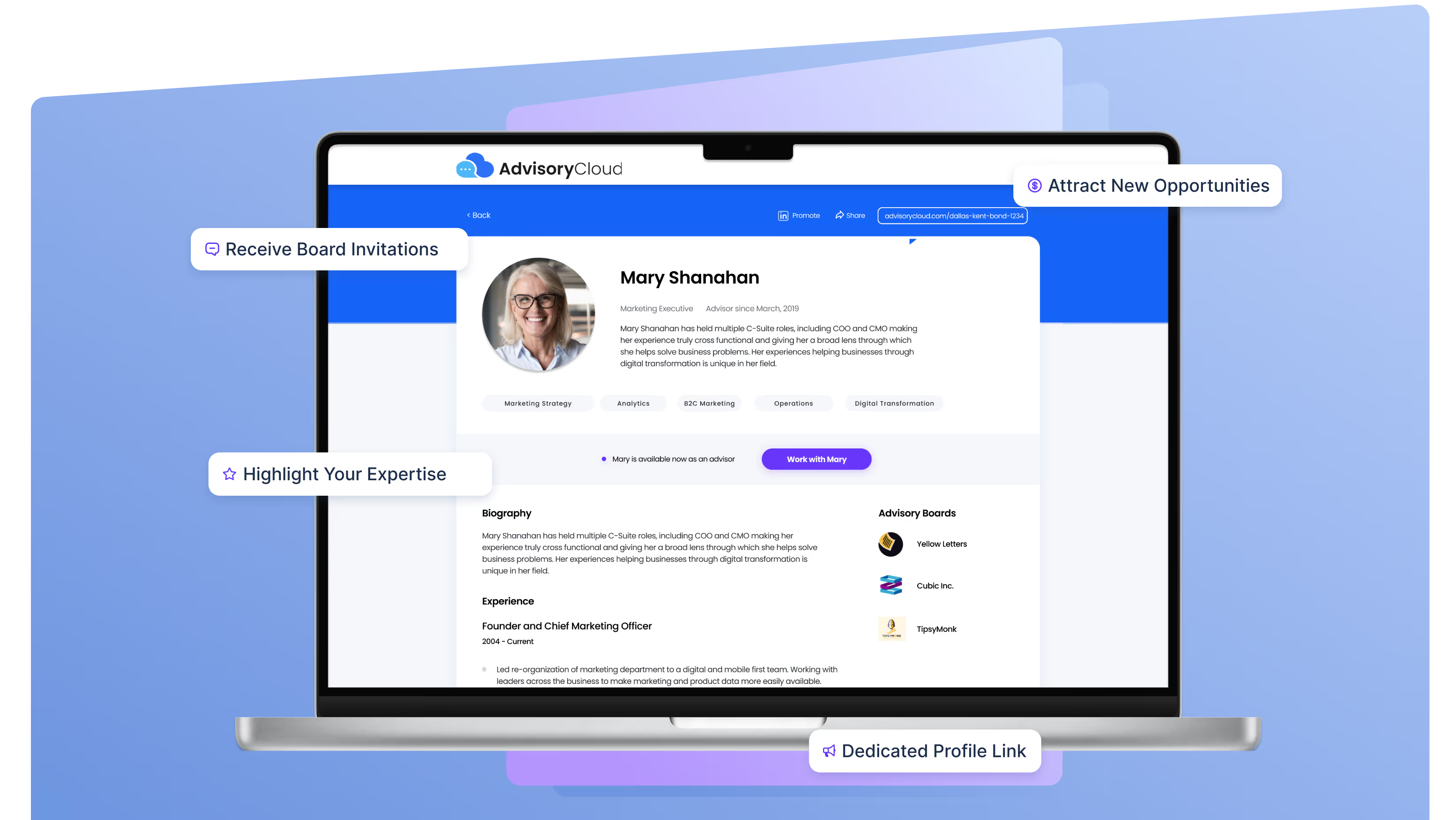March 16, 2023

As a VP of Marketing, you have a wealth of knowledge and experience that can be invaluable to businesses seeking guidance and growth. By transitioning into a business advisory role, you can leverage your skills and expertise to provide strategic guidance and drive positive change for your clients. In this article, we’ll explore the key steps and strategies you can take to become a successful business advisor as a VP of Marketing.
The role of a VP of Marketing in business advisory
The role of a business advisor is to provide strategic guidance, support, and expertise to clients seeking to improve their businesses. As a VP of Marketing, you have a unique perspective and set of skills that can help you provide valuable insights and advice to businesses seeking to improve their marketing strategies and overall performance.
One of the key responsibilities of a VP of Marketing in business advisory is to analyze market trends and consumer behavior to identify opportunities for growth and improvement. By staying up-to-date on the latest marketing techniques and technologies, you can help businesses stay ahead of the competition and reach their target audience more effectively. Additionally, you can provide guidance on branding, messaging, and communication strategies to ensure that businesses are effectively communicating their value proposition to their customers.
The benefits of being a business advisor as a VP of Marketing
Transitioning into a business advisory role as a VP of Marketing can offer a range of benefits, both professionally and personally. First and foremost, you can leverage your skills and knowledge to help businesses grow and succeed, which can be incredibly rewarding. Additionally, you can develop new skills, expand your network, and potentially increase your earning potential by offering high-value advisory services to clients.
Another benefit of being a business advisor as a VP of Marketing is the opportunity to gain a deeper understanding of various industries and markets. As you work with different clients, you will be exposed to different challenges and opportunities, which can broaden your perspective and help you develop a more well-rounded approach to marketing. This can also help you stay up-to-date with the latest trends and innovations in your field, which can be valuable knowledge to bring back to your own organization.
Key skills needed to become a successful business advisor
While your experience as a VP of Marketing will provide a solid foundation for a transition into business advisory, there are several key skills that will help you become even more effective. These include strong communication and interpersonal skills, critical thinking and strategic planning abilities, knowledge of business and financial management, and the ability to build strong relationships with clients.
Another important skill for a successful business advisor is the ability to adapt to changing market conditions and industry trends. This requires staying up-to-date with the latest developments in your clients' industries and being able to provide relevant insights and recommendations.
In addition, a successful business advisor must possess strong leadership skills. This includes the ability to inspire and motivate clients to take action, as well as the ability to lead by example and set a positive tone for the client's organization.
Steps to take towards becoming a business advisor as a VP of Marketing
If you’re interested in transitioning into a business advisory role as a VP of Marketing, there are several key steps you can take to pursue this path. First, research and learn about the business advisory industry, including trends, best practices, and potential client needs. Second, work on developing or honing the key skills needed to succeed as a business advisor. Third, build up your network and reputation by attending industry events, speaking engagements, and other networking opportunities. And finally, start developing your advisory services and targeting potential clients.
It's important to note that becoming a business advisor as a VP of Marketing may require additional education or certifications. Consider pursuing a degree or certification in business administration, finance, or consulting to enhance your knowledge and credibility in the field. Additionally, seek out mentorship or coaching from experienced business advisors to gain insights and guidance on how to best serve your clients. With dedication and hard work, you can successfully transition into a fulfilling career as a business advisor.
Networking strategies to build your reputation as a business advisor
Networking is a critical part of building your reputation and visibility as a business advisor. Consider joining industry groups and associations, attending conferences and events, hosting webinars or workshops, and writing articles or blog posts on topics related to business advisory. Additionally, consider networking with other VPs of Marketing who may be looking for business advisory services.
Another effective networking strategy is to leverage social media platforms such as LinkedIn, Twitter, and Facebook. These platforms allow you to connect with potential clients and industry leaders, share your expertise, and engage in conversations related to business advisory. You can also join relevant groups and participate in discussions to establish yourself as a thought leader in your field. Remember to always maintain a professional and consistent online presence to build trust and credibility with your network.
How to identify and target potential clients for your business advisory services
Identifying and targeting potential clients is key to growing your business advisory practice. Consider reaching out to businesses in your industry or target market, attending industry events, and leveraging your network to identify potential clients. Additionally, consider offering free consultations or assessments to help potential clients understand the value you can provide.
Another effective way to identify potential clients is to conduct market research. This can involve analyzing industry trends, identifying gaps in the market, and understanding the needs and pain points of businesses in your target market. By conducting thorough market research, you can tailor your services to meet the specific needs of potential clients and position yourself as a valuable resource.
Once you have identified potential clients, it's important to target them effectively. This can involve creating targeted marketing campaigns, developing personalized pitches, and building relationships with key decision-makers. By focusing your efforts on the most promising leads, you can maximize your chances of converting potential clients into paying customers.
Best practices for managing client relationships and expectations as a business advisor
Managing client relationships and expectations is critical to building a successful business advisory practice. Some key best practices include clear communication, setting realistic goals and expectations, providing regular updates and progress reports, and being responsive to client needs and feedback.
Another important best practice for managing client relationships and expectations is to establish trust and credibility. This can be achieved by demonstrating expertise in your field, being transparent about your processes and methodologies, and delivering on your promises. It is also important to actively listen to your clients and understand their unique needs and challenges, so that you can tailor your advice and recommendations accordingly. By building strong relationships with your clients and consistently exceeding their expectations, you can establish a reputation as a trusted and reliable business advisor.
Common challenges faced by VPs of Marketing transitioning into business advisory roles
Transitioning into a business advisory role can come with its share of challenges. Common issues include lack of experience or knowledge on business management and financial concepts, difficulty attracting clients, and managing expectations with clients.
Another challenge that VPs of Marketing may face when transitioning into a business advisory role is the need to develop new skills. While marketing and business advisory roles share some similarities, such as the need to understand customer behavior and market trends, there are also significant differences. Business advisors need to have a deep understanding of financial analysis, risk management, and strategic planning, which may require additional training or education.
In addition, VPs of Marketing may struggle with the shift in mindset required for a business advisory role. Marketing is often focused on short-term goals, such as increasing sales or brand awareness, while business advisory roles require a more long-term perspective. Advisors need to be able to identify potential risks and opportunities for growth, and develop strategies that will help their clients achieve sustainable success over time.
Strategies for overcoming challenges and building a successful business advisory career
To overcome challenges and build a successful business advisory career, consider working on developing your knowledge and experience in key areas, leveraging your network to build credibility and visibility, being persistent and focused in your marketing and business development efforts, and continuously refining your approach and services based on client feedback and market trends.
Another important strategy for building a successful business advisory career is to stay up-to-date with the latest industry trends and technologies. This can involve attending conferences and workshops, reading industry publications, and networking with other professionals in your field. By staying informed and knowledgeable, you can provide your clients with the most relevant and effective advice, and position yourself as a thought leader in your industry.
Best resources and tools for staying up-to-date on industry trends and developments
Staying up-to-date on industry trends and developments is critical to providing effective business advisory services. Some key resources to consider include industry publications and websites, conferences and events, networking groups and associations, and industry-specific training and certification programs.
Success stories and case studies of VPs of Marketing who successfully transitioned into business advisory roles
There are countless success stories of VPs of Marketing who have successfully transitioned into business advisory roles. By studying their approaches and strategies, you can gain insights and inspiration for your own career transition. Look for case studies, testimonials, and success stories from reputable sources to learn more.
By following these key steps and strategies, you can successfully transition into a business advisory role as a VP of Marketing, and provide valuable strategic guidance to help businesses thrive and grow.
See what boards you match with.
See what you qualify for with our 2-minute assessment.


Similar Articles

August 20, 2025
What every CIO needs to do in their first 100 days.
August 20, 2025
The Top 10 Mistakes that CEOs Make
August 20, 2025
The 8 Qualities of high performing CEOs
August 20, 2025
Setting Non-Financial Goals for Career Success
August 20, 2025
How to Choose the Right Mentor: A Comprehensive Guide
August 20, 2025
How to Become a Board Member: A Step by Step Guide
August 20, 2025
How networking with your executive peers will help you grow.
August 20, 2025
Do You Need a Sponsor or Mentor to Advance Your Career?
August 20, 2025
Achieving Tech Career Goals for Mid-Career Professionals
August 20, 2025
5 Ways to develop as a leader in your role.






